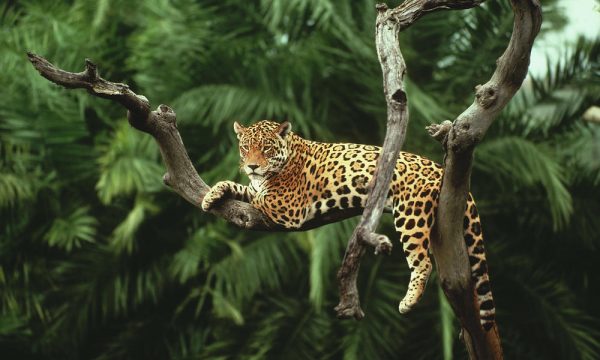

Jaguars are just one of the many tropical species threatened by deforestation. Photo courtesy of the World Wildlife Fund.
By Lilly Kujawski
Deputy Editor
It’s not uncommon for people to cut back on paper use to “save trees”. However, evidence shows that cutting out meat would actually be much more effective. It turns out that animal agriculture is the number one cause of deforestation. The cleared land is used for growing the thousands of tons of soy and corn we use to feed our livestock.
Currently, 80 percent of deforestation across the world can be attributed to animal agriculture. One Green Planet reports that “33 percent of agricultural land worldwide is used solely for livestock feed production. And when you combine that with the amount of land used for grazing and housing animals, you’ll realize that we have a huge problem.”
Research from Canopy, an activist organization aimed to protect and nurture forestry, reports that trees are crucial in producing oxygen and creating habitats for wildlife. Trees are also responsible for reducing greenhouse gasses. A loss of forest area can result in a great increase of CO2 emissions.
According to a report from NASA, the country that has experienced the greatest amount of deforestation is Brazil, followed closely by Indonesia. Deforestation tends to harm rainforests the most. Rainforests have more biodiversity than any other biome, harboring nearly half of all species on the planet.
This rapid decrease of rainforest areas could pose a huge risk for key species. The possibility of extinction of even one species could create a ripple effect through our entire food web.
The amount of plant-based food we grow to feed animals raised for slaughter is enough to eliminate world hunger across the globe. So, why don’t we all just switch to veganism, the seemingly perfect solution? For some, it’s just not that simple. For every reason to stop eating meat, carnivores can usually find a way to justify why they’d rather not give it up.
It seems that we spend the least amount of time talking about the impact of the meat industry on our planet’s forests. Maybe that’s because we’d rather print our pages double-sided and plant trees on Earth Day than stop eating a diet so culturally ingrained in us.
Reducing excess paper use, buying recycled products, and planting saplings are all valid efforts, but how big of a difference are they really making for our planet? We tend to take sustainability action primarily when it is most convenient for us, or when it’s the latest trend. We don’t like solutions that involve significant changes to our lifestyles and habits.
There are, of course, other factors to consider. Infrastructure, mining, logging, and forest fires are also major contributors to deforestation. Finances, industry, and policy play a big role in dictating how we treat the planet. The meat industry is responsible for a massive economical influx in our country, and throughout the globe, but it’s time to shift our perspective and determine where our priorities lie.
While the issue of deforestation may seem a distant and foreign occurrence, the effects hit close to home. The high rates of deforestation we are seeing could prove detrimental for human and environmental well-being. If we are to take serious steps in conservation efforts, we must think long and hard about the impact our actions have on the environment. At what point will we finally decide that enough is enough, and work together to create a culture of long-lasting sustainability? What are we willing to sacrifice in order to protect the planet that we are so dependent upon?
Summer semester students will be among first to see full shift Alice McGuire | Deputy…
Experts share insights on how to file, education credits Yana McGuire | Staff Writer U.S.…
Teresa Quinones | Contributor Eric Jiskra vividly remembers sitting in the passenger seat of his…
Beck Elandt | Staff Writer Tariffs announced in early February have been in effect since…
How cost of living compares for 2-year, 4-year students Beck Elandt | Staff Writer When…
Lily Cole and Inayah Amir Bey | The Washtenaw Voice Question: What’s your dream vacation…